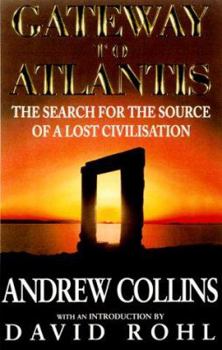Gateway to Atlantis: The Search for the Source of a Lost Civilization
Select Format
Select Condition 
Book Overview
A historian's investigation may solve one of humankind's greatest and most enduring mysteries: the location of the "Lost City" of Atlantis. 16-page photo insert. Line drawings. This description may be from another edition of this product.
Format:Hardcover
Language:English
ISBN:0786708107
ISBN13:9780786708109
Release Date:November 2000
Publisher:Basic Books
Length:448 Pages
Weight:1.65 lbs.
Dimensions:1.4" x 6.4" x 9.3"
Customer Reviews
5 ratings
Atlantis in the Indies (you'll never guess where!)
Published by Thriftbooks.com User , 23 years ago
This is by far one of the best books on Atlantis I've ever read. Plus, it's the only theory that makes sense. I won't give away any details, but Andrew Collins has a VERRRRY interesting idea of where Atlantis is. In my opinion, his is the most location for the lost empire. Calling all ATLANTIS: THE LOST EMPIRE fans: you gotta read this one, you'll love it! Trust me!
At last, a down to earth Atlantean theory!
Published by Thriftbooks.com User , 23 years ago
Its nice to finally read something about Atlantis which doesn't rely on ancient astronauts or mystical crystals! Andrew Collins believes that Atlantis was located in the West Indies and related islands, basing his theory not on shadowy ideas about ruins under the ocean but on realistic measurements of travel times, directions, and other clues found in Plato and other ancients who mentioned a lost civilization to the west. While this book won't do much for the von Daniken crowd, it will certainly please those who can distinguish fact from mysticism!
Review by George Erikson, author of ATLANTIS IN AMERICA
Published by Thriftbooks.com User , 23 years ago
In this insightful reappraisal of the Atlantis myth Collins begins by telling us that it was not just Plato who wrote of Atlantis -- informing us that the Egyptians knew of more than one earlier rise and fall of civilization -- but that a contemporary historian, Theopompus, citing a different source, wrote of an immense continent with great cities that surrounded the outside world. Quite rightly, Collins dismisses small islands in the Mediterranean and the mid-Atlantic ridge as possible sights for the sunken continent, and he eventually concludes that the continent itself did not sink, although its coastal cities must have perished. Why? Because coastal cities of 11,500 years ago (the time given to the destruction of Atlantis by Plato) would have been built on land now 400 feet below the sea (at the end of the Pleistocene sea levels were 400-420 feet lower than at present. Where was Atlantis according to Collins? I want you to read the book. It is worth the Journey. And remember, much of the Caribbean is shallow shoal water that was once well above sea level.
The most amazing and capitvating book I have ever read
Published by Thriftbooks.com User , 23 years ago
This book takes you on a long journey, which when you get to the end makes you as exhusated as if you had really travelled throughout the times that Collins writes about. It opened my eyes to a whole new realm of thought.It is accesible and captivating, I couldn't put it down, I devoured every sentence of this intriguing tale. If you have only the mildest of interest in ancient ideas, myths and legends. I guarentee that this book will fan that flame into a fire.It gave me the thirst to discover ideas of this magnitude for myself, and just maybe awakened the true path within me.Or perhaps it was simply so well written that i entered into the book and for the time i read it became at one with the author. That in itself makes it a remarkable book.
A most enjoyable work on a fascinating subject
Published by Thriftbooks.com User , 24 years ago
The ever elusive Atlantis has never failed to arrest the imagination of many throughout the ages. In this latest and impressively researched work, Andrew Collins traverses the evidence available in order to unravel the 3 prime mysteries - whether Atlantis indeed once existed, its probable location in the modern world, and how it all came to an end.Starting with Plato's Timaeus and Critias, Collins ploughs through a formidable mass of ancient and not-too-ancient literature to garner evidence about the lost land and its probable topography. He then applies the result with meticulous care (and with much erudite discussion in the process) to all the prime contenders for the location of Atlantis to determine which in fact is the most likely candidate for the legendary realm. He then seeks to corroborate the findings with legends from both sides of the Atlantic (in particular those from central America) as well as other more scientifically verifiable facts, such as information gleaned from ancient relics, the presence of tabacco in Egyptian mummies and some distinctive method for dyeing cotton. Having established the location of the lost Atlantis, the author completes his theory by examining the sort of catastrophe that brought about the end of the advanced civilisation there as well as the possible fate of those who managed to escape from it.What makes this highly readable book doubly commendable is that the author has at all times followed the available evidence instead of making wild guesses and unsubstantiated propositions in order to advance his theories. Such a scholarly approach has made the discourse much more convincing than many other books written about lost civilisations. And if Collins's conclusions are not absolutely compelling, they nevertheless are very well argued and presented and warrant serious consideration by ancient historians. Besides, all those materials amassed by Collins for the book are already by themselves of great value to those interested in the subject. David Rohl's Introduction is also very illuminating and provides enlightening remarks about the methodology used by many alternative historians. A most enjoyable work on a fascinating subject. Highly recommended!





